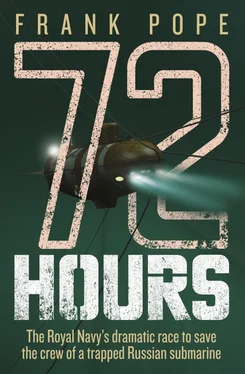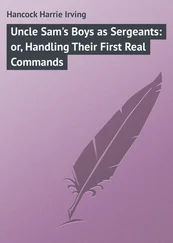She was used to the long absences, and normally thought nothing of a two-month period apart. After all, when he had been a lieutenant, he was away for between nine and 12 months at a stretch. She’d learnt to lock away her emotions. But for some reason this time – although Valery had only been away for a week – thoughts of him kept bubbling up to the surface.
Fifty kilometres to the west of Petropavlovsk town, on the wide plains reaching out beneath the Yakki volcanoes, Yelena Milachevskaya’s [1] In Russian, the female version of a surname has a different ending. The last name of Slava Milachevsky’s wife is Milachevskaya.
thoughts were also probing beneath the Pacific, thinking of her man. While she was always brimful of pride for Slava, the pilot of AS-28 , today she was worried. She was watching her twin girls play in the short, stubby grass, but the sun was making her tired eyes hurt as it glinted off the gold frames of her oval glasses. She’d woken in the early hours of the morning with a start. Staring into the darkness she’d tried to banish the swirling image that had bled from her dream, but every time she blinked it was there. She recognised the hand that seemed to float in front of her as her own, but its colours were unnaturally bright, and on her finger was a strange, ugly wedding ring. She’d woken herself up screaming, ‘Take it away! That’s not my ring!’
The afternoon sun was warm on Yelena’s pale skin, but her soul felt cold. Everybody knew that the women in her family could predict the death of their husbands, and there could be no clearer portent than seeing another ring on her finger. She had felt panic rising inside her.
The Naval operator had calmed her down when he eventually answered the phone that morning. He’d become like a friend, thanks to Yelena’s frequent calls. She liked to be kept updated, for even at the best of times she was very nervous of losing her Slava. Good men were very hard to find, she often said, especially in Petropavlovsk. While Yelena held the line the operator tried the Georgy Kozmin. He came back two minutes later to say that there was no reply. That was no reason for worry though, he said. The ship must simply be out of range. After all, the sea was flat calm, and no trouble had been reported.
But what about the strange wedding ring on her finger? Just because it was calm on the surface didn’t mean that everything was fine. Yelena knew that better than most. Despite the bright day, the beautiful view and the laughter of the girls, her insides were starting to churn. She started thinking of all the times Slava had come home complaining about things going wrong with his submersible, the time that the electrics caught fire inside, burning up their precious oxygen. Or when a porthole burst and the freezing sea flooded in. The machine was in urgent need of an overhaul, having not been repaired for so many years. Slava was supposed to be accompanying it to Nizhny Novgorod at the end of August to help with the repairs. But that would be too late, she knew. Something terrible was going to happen. Her Slava was going to die. How was she going to break the news to the girls, his beloved twins?
Thursday, 4 August
16.15 Kamchatka
AS-28 , 210 metres beneath Berezovya Bay
With their work on the first face of the 100-metre-long hydrophone completed, Slava Milachevsky began to turn AS-28 starboard into the current. The enormous structure disappeared into the black water, but he could feel its awesome size behind him, as though his mind had become sonar-enabled. He didn’t even need to glance at the compass or the green sonar display to know that he’d judged the submersible’s slip through the current well. When the wall of steel appeared in the porthole to his right he saw that the array was indeed lined up perfectly to the starboard once more, ready for their inspection of the other side. He didn’t smile, but nodded to himself solemnly. Man and machine were working as one.
Around him the crew were all at their stations, monitoring the submersible’s systems. Through the hatch behind him, the three Warrant Officers were in the second compartment keeping an eye on the engine and the electrical systems. All seemed well: AS-28 ’s motors were whirring, pushing the craft along at a steady two knots.
Captain 1st rank Valery Lepetyukha was sitting directly behind Milachevsky, his eyes ringed by dark circles. He surveyed the men, his thick, grey-flecked moustache twitching. He was experienced on the Priz class of submersible, but it had been a while since he’d been on board. Strictly speaking, he shouldn’t be there: he’d lost one of his kidneys and a third of a lung to the surgeon’s knife, and was supposed to be restricted to pushing papers at headquarters. The usual captain was away on leave – it was August, after all.
Gennady Bolonin was in the seat in front of him, watching the array glide past in the external floodlights. The civilian engineer was there to help with the work they were doing on the hydrophone array, as well as making some checks ahead of the bathyscaphe’s upcoming refit.
Aware of Bolonin’s importance and his expertise with the machine, Milachevsky was making an extra effort to pilot it smoothly. He responded instantly as the steering started pulling to starboard. He started feeding in left rudder, but still the submersible veered towards the array.
Captain Lepetyukha felt himself start to pitch forward softly, as though he was on a train that had started to slow.
‘All stop! Full reverse engines!’ he ordered, his voice shattering the quiet, echoing hum of the submersible’s motors.
Milachevsky immediately pushed the thrust levers into the reverse position, but his whole body began to tense. Why had he not stopped as soon as he’d felt the restriction? Why did he just try to keep going straight? He cursed under his breath, eyes darting over the portholes, sonar display, warning panel and the periscope. That’s when he saw it.
Slicing down through the black water ahead were several lines, draped over the side of the array and cutting across their path like a tripwire. His chest tightened. Whatever they were – ropes, cables or nets – they were bad news. He was only halfway through the thought when there was a terrible, grinding crash. AS-28 had been dragged into the huge steel float, her starboard side scraping to a halt across its barnacle encrusted surface.
Adrenaline had quickened Milachevsky’s breathing, and he had to swallow before turning to make a report to the Captain. Lepetyukha listened, then stared at him calmly through rheumy eyes as if assessing the strength of his character.
It was Captain Lepetyukha’s turn to peer through the periscope’s binocular-shaped cowling. He had worked in submersibles for 30 years, and nothing came as too much of a surprise to him any more. The solution to all problems was a calculated approach and an absence of panic. In most underwater emergencies, the best option was to head straight back to the surface, and a less experienced captain might have decided to do so, hoping that the rope would slide over the hull and fall away beneath them. But Lepetyukha knew that just a small snag on a hatch fitting could trap them and there would be no telling where they were caught. The cable he could see in the glass was evidently not the one holding them in place. It was also so covered in weeds and other marine growth that it was not even possible to tell if it was made of wire or rope.
Lepetyukha rotated the scope around to the port, peering into the dark water, looking for other obstructions. If they’d snagged a fishing net, there was no telling how much more of it could be around.
Читать дальше












